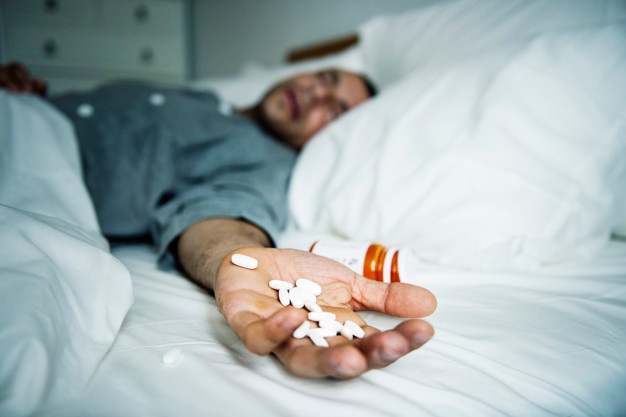
Methadone is a long-acting synthetic opioid painkiller that is commonly used for the treatment of opioid drug addiction. In other words, many individuals recovering from addiction to drugs like heroin or prescription painkillers are prescribed methadone to relieve symptoms of withdrawal.
When methadone is taken as prescribed, it is a helpful tool for individuals in the early stages of opioid addiction recovery. However, because methadone is an opioid, it has the potential for abuse as well. Because of this, methadone treatment should only be done under the supervision of certified medical professionals. Unfortunately, some doctors may prescribe methadone for long-term pain relief because it is a relatively low-cost option. This leads to methadone abuse and dependency for many individuals.
Let’s take a look at what methadone is, what the symptoms of addiction are, and how to recover from methadone addiction.
Methadone addiction is not a commonly discussed topic, as many doctors see this medication as a vital aspect of opioid addiction recovery. However, because methadone is an opioid, addiction is an all-too-common side effect. Methadone addiction occurs often because the drug relieves the user’s pain. As time goes on and their tolerance builds, more of the drug is needed to produce an effect. This leads to dependency and eventually, addiction.
Methadone is known to produce the following side effects , which would become more frequent if the medication is being abused:

If an individual is suffering from methadone addiction, they will have an increased tolerance to the drug. Additionally, they will have symptoms of withdrawal when they don’t take the substance and prioritize obtaining and using methadone over everything else.
Oftentimes, individuals suffering from methadone addiction do not believe they have a problem because they are prescribed the medication. Unfortunately, this is common among a wide variety of individuals suffering from addiction. If your loved one is addicted to opioids or methadone and in denial, it may be time to consider an intervention.
Professional interventions are family meetings where friends and family members emotionally appeal to their addicted loved one. Typically, they will work with a drug recovery coach to create statements to read aloud to the addicted individual. These statements will outline how the individual’s addiction to methadone has impacted their loved ones as well as the symptoms of the person’s addiction. This is done in hopes of convincing the person to attend professional addiction treatment.
Failure to launch syndrome is described as a young adult’s inability to leave home and create an independent life. For example, these individuals typically have a hard time setting and achieving goals out of a fear of taking chances.
Many young adults with failure to launch syndrome partake in self-destructive behaviors, with one being substance abuse. Oftentimes, these individuals become addicted to drugs and get sent to treatment by their families. During treatment, if they use methadone, their chances of becoming addicted to the substance are high if they have not addressed their issues with failure to launch.
If your loved one suffers from a failure to launch syndrome and methadone addiction, it’s time to consider an intervention.
Methadone addiction is a serious condition that must be treated professionally. Whether the individual abused methadone recreationally or was prescribed the drug, treatment for methadone addiction must include medical detox and comprehensive therapy.
Because methadone is an opioid, medical detox is required for the patient to overcome withdrawal symptoms. While some individuals gradually taper off of methadone, others may be switched to another medication. When an individual is switched to another medication, they are typically given non-addictive medications with a low risk for abuse. Additionally, psychiatric medications may be prescribed to treat any co-occurring mental health conditions the individual is dealing with.

Once a person completes the detox stage of methadone addiction treatment, they will begin comprehensive therapy. This may be done within the same facility or at another clinic. Therapy for drug abuse helps patients recover from the mental, emotional, and spiritual aspects of addiction. Additionally, they learn new coping mechanisms, social skills, and emotional regulation to prevent them from relapsing in the future.
Michael Herbert, The Recovery Guide, has more than 30 years of experience working closely with individuals and families dealing with addiction and recovery issues. He is a seasoned Coach and can help you and your family establish long-term goals and access the tools you need for continued abstinence and recovery for the entire family. Get in touch with Michael today at 561-221-7677 to schedule an appointment.